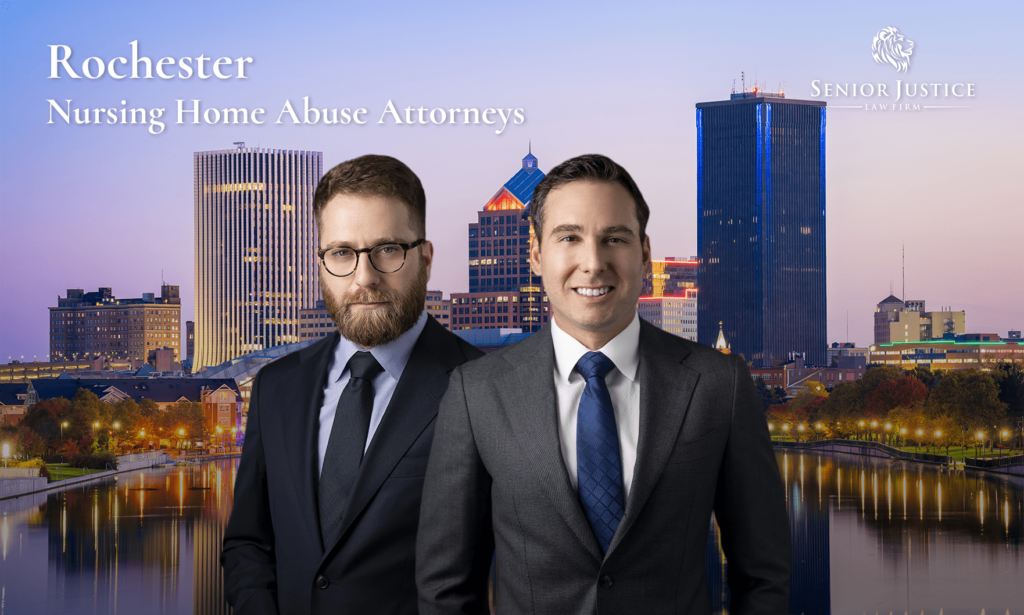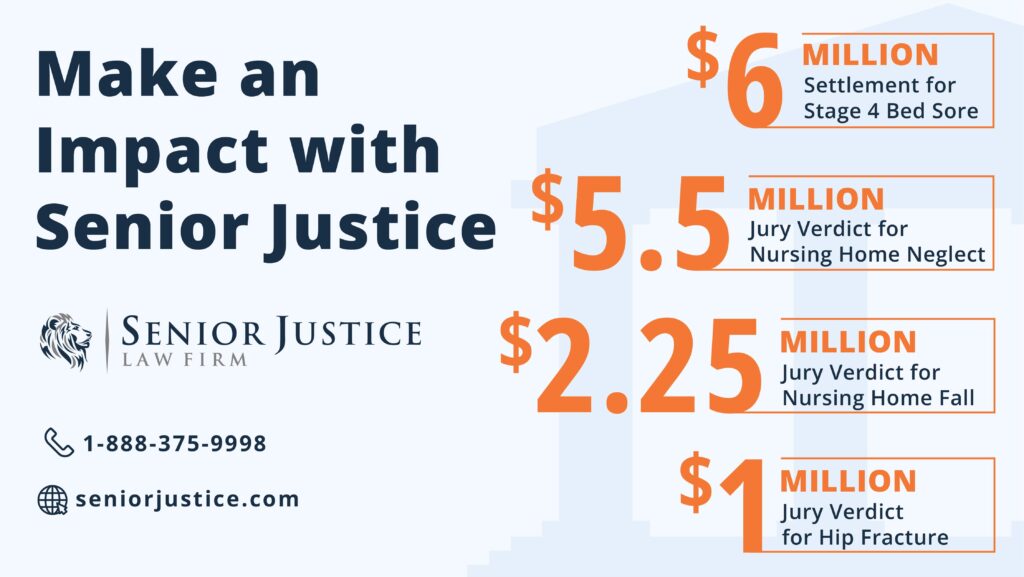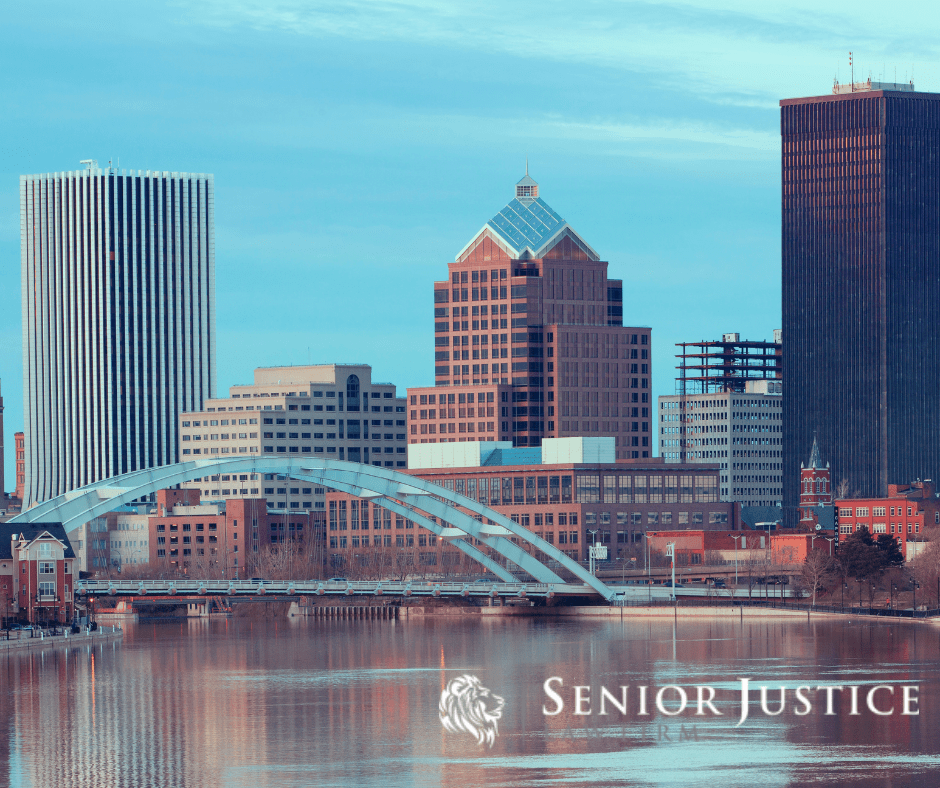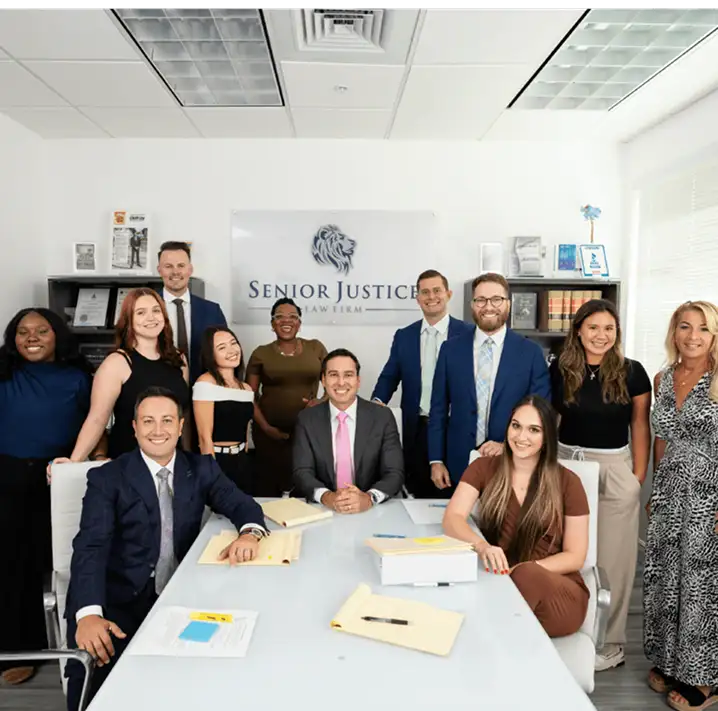At Senior Justice Law Firm our Rochester Nursing Abuse Lawyers can Assist Families in the Fight for Justice
Rochester, NY is a dynamic city that has produced some of the most important technological inventions and advancements in consumer products in modern times. Just like this innovation Mecca on the south shores of Lake Ontario, Senior Justice Law Firm dedicates itself to seeking justice for victims of abuse and neglect in Western New York nursing homes through innovative techniques and proven strategies.
When you choose Senior Justice Law Firm as your Rochester nursing home abuse lawyers, you can expect compassionate assistance with:
- Communicating with the Facility Owners/Managers and their Legal Counsel
- At this point, you are likely frustrated and fed up with speaking with management. We frequently find that the second a Rochester nursing home resident is abused or neglected, the whole facility tries to cover up the accidents through deceit and lies. Dealing with the facility management can be draining and time-consuming, given your focus is likely on getting better treatment for your loved one. The Rochester Nursing Abuse Lawyers at Senior Justice Law Firm, PLLC can take the pressure off you and your loved ones by handling communications with the insurance company and facility management.
- Requesting Documents and Investigating the Case
- Families tend to have some level of documentation from the facility or hospital, but this information is often incomplete. It can be a giant hassle to wrangle the appropriate medical records to investigate the case. Our Rochester Nursing Home Abuse Lawyers can assist with requesting the medical records and contacting the relevant state and federal agencies. Further, Senior Justice Law Firm will review past records, photographs, and other documents to determine if there were patterns of underfunding, underbudgeting, understaffing, or repeat abuse by staff members.
- Demanding the compensation your family is entitled
- Your family likely is contacting us not only to receive compensation for the medical bills and pain and suffering caused by facility neglect and abuse but to make a change so other elderly residents do not suffer the same fate. Our Rochester Nursing Home Abuse Lawyers focus on fighting for compensation to hurt a neglectful facility’s bottom line. Many of the injuries caused in Rochester facilities are due to management understaffing the nursing home to increase profits. By holding these abusive Rochester nursing homes accountable, you are increasing the probability they will appropriately staff in the future to avoid other injuries.
What are Common Injuries at Rochester Nursing Homes and Assisted Living Facilities?
There are a number of indicators that suggest a loved one has suffered abuse or neglect at a Rochester nursing home or assisted living facility. If any a loved one has suffered any of the below, it is important to investigate further:
- Bedsores – bedsores are wounds that are caused because of consistent pressure on the skin from remaining in the same position for significant amounts of time. These wounds are also known as decubitus ulcers or pressure wounds and are preventable with adequate care. For a resident who is bedbound or chair bound, staff must reposition the resident at least once every two hours. If you do not see your loved one being repositioned frequently, you need to alert staff immediately, as bedsore may be developing. At first, a pressure wound may look like a red spot. These small red spots are called a Stage I bedsore. If improperly cared for, these Stage I decubitus ulcers can transform into a Stage IV wound which can go all the way down to the bone. Bedsores are incredibly painful and may require expensive and painful treatments such as debridements or wound vacs. If you notice any skin breakdown on your loved one, make sure to take pictures to document any change in condition.
- Falls – according to recent calculations from the Centers for Disease Control, around 1,800 elderly nursing home residents die from falls per year. If an elderly resident survives a fall, they are likely to have traumatic injuries such as bone breaks or fractures. Certain fractures, such as femur fractures, tib-fib fractures or hip fractures can lead to permanent disability and significantly reduced quality of life. Nursing homes have a duty to assess each resident’s fall risk and to mitigate fall risks throughout the facility. This means they need to ensure the property is safe (avoiding hazards such as slippery floors, uneven walkways, improper wheelchairs). Additionally, this means the facility must staff appropriately to ensure residents are properly assisted with their activities of daily living
- Dehydration – an elderly resident can become dehydrated if not provided enough liquids. Dehydration can occur from staff not providing enough water or sustenance by feeding tube. Additionally, dehydration can occur due to diuretic medicine provided. Dehydration is fixable with ease but can lead to devastating effects if not dealt with in a timely manner by staff.
- Malnutrition – Malnutrition is caused by the lack of proper nutrients absorbed by the body. One potential cause of malnutrition is an overworked staff that does not ensure a resident is receiving the proper food or is consuming the food (especially if they needed assistance with eating). Notable signs of malnutrition are rapid weight loss, change in behavior and increased vulnerability towards illness.
- Medication Errors – effective administration of medicine is integral to the appropriate care of a nursing home resident. If staff is not provided the correct medicine or is too overworked to provide it at requested intervals, serious medical issues can occur.
- Changes in Behavior – if your loved one is suddenly acting frightened of staff, this may be an indication that physical or verbal abuse is occurring. Further, if dementia or cognitive functional decline increases, this may be an indicator that a resident is suffering from an infection, such as a UTI, or has suffered an injury they are unable to describe.
- Unexplained Injuries or Death – if an accident occurs at a Rochester nursing home, staff should contact you in real-time to tell you what happened. If you notice unexplained injuries, such as broken bones, fractures or bruising, and staff cannot explain how it happened, they may be covering up negligence or abuse.
Can a Nursing Home be Sued for the Actions of Its Employees?
Yes. Under the principle of respondeat superior, employees are considered to be the agents of their employers, which means that you can sue an employer for the misconduct of its employees. This is important because, if your claim is large, the employee is unlikely to possess the financial resources to pay a judgment against him.
This principle also applies to a situation where a nursing home resident is hurt by another resident rather than by an employee. In this case, you would have to prove that the employee was negligent because, for example, he failed to properly supervise the residents.
How Does a Wrongful Death Lawsuit Base on Nursing Home Abuse Work?
Under New York’s wrongful death statute, the personal representative of your deceased loved one’s estate can file a wrongful death lawsuit. Typically, the personal representative is a close relative. The personal representative may sue for the following losses:
- Funeral and burial expenses
- Health care expenses arising from your deceased loved one’s final illness or injury
- Pain and suffering endured by your deceased loved one
- Nine percent interest on the foregoing amounts, starting with the date of death
Other possible damages such as lost wages, lost household services and lost parenting services normally do not apply to nurse home residents. Unfortunately, family members cannot recover for their own grief and mental anguish.
Damages are divided among the estate itself and the people who stand to inherit your deceased loved one’s estate (typically close relatives).
What Are Some of the Telltale Signs of Nursing Home Abuse?
The following are only a few of the many possible signs of nursing home abuse:
- Bedsores (pressure ulcers)
- Dehydration
- Personality changes such as frequent agitation or withdrawal
- Fractures or head injuries
- Frequent infections
- Malnutrition
- Unexplained changes in body weight
- Silence or withdrawal in the presence of staff members
- Heavy sedation
These symptoms do not necessarily establish nursing home abuse, but they likely do warrant investigation.







